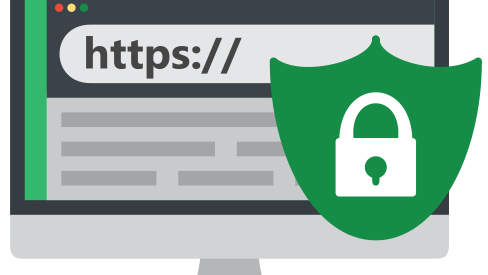5 REASONS YOUR WEBSITE SHOULD HAVE SSL CERTIFICATE

In 2018 Google started penalizing websites without HTTPS (hypertext transfer protocol secure). Traffic started dropping for a lot website owners because of drop in ranking. Many web design agencies in Nigeria started getting complains from web owners that visitors to their website are being warned of security issues on their web. A simple installation of an ssl certificate would have solved that problem.
SSL Certificates are small data files that digitally bind a cryptographic key to an organization’s details. When installed on a web server, it activates the padlock and the https protocol and allows secure connections from a web server to a browser. Typically, SSL is used to secure credit card transactions, data transfer and logins, and more recently is becoming the norm when securing browsing of social media sites.
SSL Certificates bind together:
- A domain name, server name or hostname.
- An organizational identity (i.e. company name) and location.
This is the reason we are presenting the 5 benefits of having SSL on your website. They include
#1 – TO PROTECT SENSITIVE INFORMATION
As data moves between your client and you, it passes from one computer to another on its way to its final destination. Think of it as if it was the Nigerian Postal Service. The mailman picks up the letter at your house, then takes it to the local office, where they sort it. From there it goes to a distribution center where it gets sorted again. Then it moves to the recipient’s local office, and on to its final destination. A lot of people handled your letter during its journey, and any number of them could have looked at it.
The same is true with the information your clients give you over the internet. Their data moves from server to server until it reaches your site, its final destination. At any of those data stops, a hijacker can easily copy the data. Your customers expect you to protect their data from prying eyes.
Since you can do very little to keep that from happening, the best way to protect sensitive data is to send it written in code. HTTPS encrypts data so that it is unrecognizable. Once it arrives safely, the information is the decoded for use.
#2 – ENCRYPTION PROVIDES AUTHENTICATION FOR USERS
One way identity thieves gather information is by setting up malicious web sites and masquerading as you. They can create almost identical versions of your website, or they build their own version where they misrepresent themselves as you. The user has no way of knowing that they are giving their sensitive information to criminals. However, your HTTPS designation on the URL shows visitors that your website has been verified as authentic. Google uses a visual cue, in the form of a padlock to demonstrate that it is an SSL secure website. This symbol creates a sense of security for your customers.
#3 – PCI COMPLIANCE
If you process any credit card transactions on your site, then you are required to have encryption. The Payment Card Industry Data Security Standard (PCI DSS) applies to all companies, online or not, that accept credit card payments. For online companies, this compliance means you must have an SSL secure website. No legitimate e-commerce site can operate without an SSL certificate. The only ‘out’ is if you go through a third-party payment processor such as Paypal. In such a case, Paypal accepts responsibility for the handling of your customer’s financial information.
Having an SSL secure site allows you handle your own financial transactions. Third-party services like Paypal are expensive and can cost you about 5% in transaction fees. Keep in mind that the free SSL certificates won’t work for e-commerce. Instead, you need to contact your web design agency and ask for one that is appropriate for your application. An SSL certificate generally runs a couple of hundred dollars a year.
#4 – AVOID BROWSER ALERTS AND SHUT-DOWNS
Chrome now hits the user with a warning and won’t load your site if no valid SSL certificate is found on pages where sensitive information is requested. Firefox and other browsers are following suit, and Google has already sent out a proposal for all web browsers to implement this policy. (source)
Google posted the following on Google+
From the end of January with Chrome 56, Chrome will mark HTTP sites that collect passwords or credit cards as non-secure. Enabling HTTPS on your whole site is important, but if your site collects passwords, payment info, or any other personal information, it’s critical to use HTTPS. Without HTTPS, bad actors can steal this confidential data.
Having an SSL secure website ensures that your clients don’t lose trust in your company. There is nothing worse than having a “this is not a trusted site” message flashing before their eyes as they move to complete a transaction. It’s a pretty safe bet you will lose some business.
#5 – YOUR GOOGLE RANKING WILL IMPROVE WITH AN SSL SECURE WEBSITE
As stated before, Google is penalizing websites without encryption. The flip side of that is that they are giving preference to those who do have SSL. Improving your Google rank helps brand awareness and can lead to increased traffic. Increased traffic gives you the opportunity to turn leads into conversions. All of this finally culminates in increased sales.








